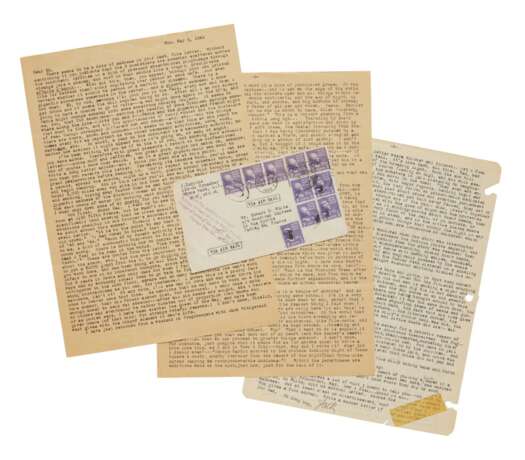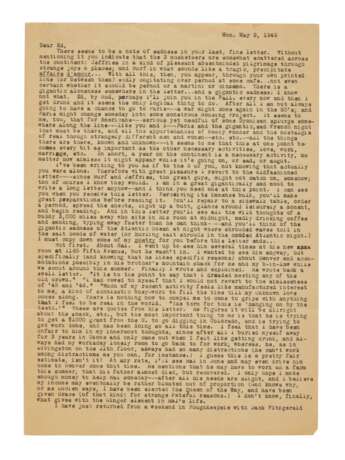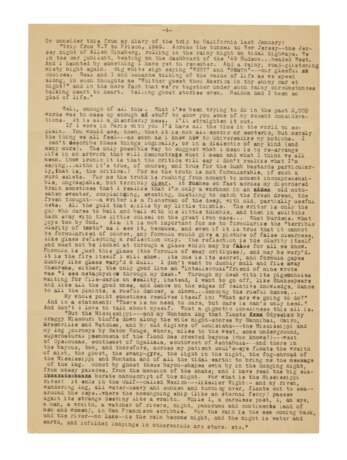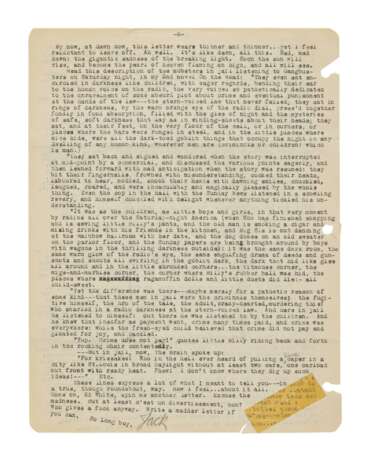ID 1108765
Lot 46 | Kerouac, Jack | Typed letter signed to Ed White, with an an excerpt from On the Road
Estimate value
$ 20 000 – 30 000
Typed letter signed ("Jack") to Ed White in Paris, sharing existential musings, an excerpt from On the Road, and his trip to Poughkeepsie with Jack Fitzgerald
6 pages (302 x 209 mm) on three leaves of assorted paper, [Ozone Park], 9 May 1949, original typed envelope with Jamaica, N.Y. postmark; first two leaves toned, light fold marks, a couple of small marginal tears, third leaf with holepunch marks, two torn, the lower with contemporary tape repair.
An epic, melancholy exploration of Kerouac's philosophy.
Kerouac commences with what will become a theme of this lengthy letter, sadness, more specially "a gigantic sadness." He senses Ed is lonely and expresses an intense desire to come and visit him in France. It seems in previous letters that the awareness of Ed being accompanied by Jeffries and Burf had led Kerouac to tone down his writing in some way. With the knowledge Ed, and only Ed, was reading, Kerouac proclaims, "Therefore with great pleasure I revert to the oldfashioned letter----since Burf and Jeffries, tho great guys, might not catch on, somehow."
Having described his latest efforts to rent a place from Hal in Denver, he relates his recent trip to Poughkeepsie with Jack Fitzgerald, his wife, and their friends. "It was one perpetual beer-drinking dream." Kerouac's relates, "everytime I went to the icebox for another quart it seemed that our original supply of 30 quarts was diminishing in an unorthodox way, that is with great rapidity." They tear about from bar to bar, even bringing Fitzgerald's one-year-old son along, but Jack and the others are knowingly haunted with the sadness of it all, the "gigantic sadness." The feeling is surmised well in a quote from Fitzgerald as remembered by Jack:
"I like people who are conscious of the gigantic sadness of the whole mad thing."—"the dumb bastards."
Jack describes a dream where only he could see his own "monstrousness" and his "falseness" while everybody else, apart from his mother, was impressed and revered him. From this initial introspective, Kerouac expounds onto a grand examination of heaven and earth and man's place in it, and man's soul ("What is Love? The meeting of two souls in a tangle of shrouds?").
Jack wrote On the Road (and the Dharma Bums - lot 55) using the continuous typed scroll as he felt constricted when he had to plan his writing or write within traditional bounds (also, "it looks like a road," letter to Cassady May 1951). This letter echoes that frustration of not being able to fully express his thoughts in writing, "[I] actually don't quite know what to say, except that I want to say everything at once to you." He similarly tried to explain his thoughts to Fitzgerald in Poughkeepsie, and couldn't. The pure purpose of his writing is to express "the thing we all feel", or in essence the universal truth. He explains, "For me the truth is rushing from moment to moment incomprehensible, ungraspable, but terribly clear." He knows what he has to say, but it is grasping the thoughts rushing around his brain and distilling them into comprehensible words that is the struggle. He calls himself a workman, "a fisherman of the deep, with old, partially useful nets", a sculptor, chipping away at a "great iron mass". Following this dramatic, poetic, searching prose, Kerouac comes back to Ed, "Don't worry about my mind, even though this is a mad letter."
Kerouac returns to the topic of the letter in lot 45, fantasizing about his imagined life in Denver. "I look forward to Denver with the kind of joy that is not present in this crazy letter." His dramatically terrible real-life experience in Denver provides a melancholic foil to the hope he expresses for his time there.
Kerouac winds up his opus with an almost page long excerpt from his working draft of On the Road, where he imagines prisoners huddled around a radio, listening to a cops versus gangsters show. On the other wide of America, "Little Billy" is listening to the same show. It starts: “They even sat encircled in darkness like children, with eager regards, bending their ear to the human voice on the radio, the very voices so pathetically dedicated to the unravelment of some absurd plot about crime and eventual punishment at the hands of the law—the stern-voiced law that never failed.” Though On the Road was famously typed in one three week long sitting, Kerouac was writing up material for the book as early as August 1948. In a letter to Hal Chase he shares the ideas for the book "overflow out of me, even in bars with perfect strangers." This early working excerpt demonstrates how nuggets of ideas would be rendered, then chopped and changed; this passage particularly engages with Kerouac's dual vision of little Billy's shiny, optimistic, gadget filled America, and the beat-filled undercarriage that the prisoners occupy.
And to finish: "Write a madder letter if you can. So long boy. Jack."
| Artist: | Jack Kerouac (1922 - 1969) |
|---|---|
| Auction house category: | Prints, graphics, books |
| Artist: | Jack Kerouac (1922 - 1969) |
|---|---|
| Auction house category: | Prints, graphics, books |
| Address of auction |
Sotheby´s 1334 York Avenue 10021 New York USA | ||||||||||||||
|---|---|---|---|---|---|---|---|---|---|---|---|---|---|---|---|
| Preview |
| ||||||||||||||
| Phone | +1 212 606 7000 | ||||||||||||||
| Conditions of purchase | Conditions of purchase | ||||||||||||||
| Business hours | Business hours
|














